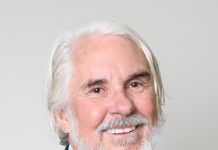Call Him Jeremiah: Laguna’s Homeless Prophet

The raw energy of fear spilled out and ran through each diner, making them a cascade of dominos going down for the count. Anastasia Café’s serene Saturday morning vibe morphed into a come-to-Jesus meeting. A massive man with thighs as thick as Giant Sequoias stood up and declared himself a preacher, messenger of his own gospel. He planted himself at the enclosed patio’s only exit. The hiss of the espresso machine steaming out smooth java and the music of easy conversation hijacked by the preacher’s booming voice. Like a prophet of old he captured this reluctant crowd. Prisoners all. Jaws dropped. Faces blank, staring. Eyes wide open, now frozen in their seats.
My farmer’s market run is a cherished time of renewal, a communal ritual after a long work-week as a psychologist. I connect with friends, linger over The Indy or settle into a corner to write. This man’s presence was messing with my chill. Here was this African American in his late 50’s who in earlier years, given his build, might have been a NFL linebacker… here he was gesturing and yelling directives at the crowd like an amped up coach pacing the sidelines during the final plays in overtime. This guy was huge, his hands massive. His heart heavy. Burdened.
A quick diagnostic assessment indicated severe mania with psychotic tendencies and a strong potential for violence. Fancy shop talk for “this guy could escalate and cause some damage here.” I surveyed the situation. Considered my options. Like an off-duty cop, I did not want to work this emergency. My psych hospital and teaching experience in crisis assault prevention techniques informed my decision. I was all in. Standing behind the counter, the owner and I made eye contact confirming collaboration. He called 911. I stepped out onto the patio. Just beyond reach, I silently took my place at his side. I listened. Waited for an opening.
In the call-and-response, dialogic preaching style of some African American churches, the preacher begged the diners, “Please help me. I’m homeless. They just let me go from Hoag Hospital. I need my medication.” Although the message was clear to my therapeutic ear, the content was tangential, loose. He turned up the volume. Like spray from a semi-automatic, his words became a battering ram. Saliva flew from his mouth. His eyes bulged. His body trembled. I moved a step closer to speak into his manic panic, “What’s your name? I want to help you get your medication.” I saw Hoag Hospital bands around his wrists. A bright orange band read in all cap letters, “HIGH RISK PATIENT”. He ignored me; knew I had an agenda. This was a familiar dance for him: “How to Avoid Psych Staff.”
I proceeded with a silent presence, intended to help him regulate, to stand down. He appeared immovable. Then to match his volume, I raised my voice, “What’s your name?” He snapped around and slammed me with a piercing glare, “I have a name but you won’t know it. I just need my medication.” Before he could turn away, I said, “Look at me. I’ll call you Jeremiah. Like the prophet.” I gave him a choice, “You can come with me to get your meds or stay here and have a meeting with the police.”
Jeremiah pressed on genuinely and without shame, “Help me, please.” This guy was not another manipulating panhandler. Instead, I was the master manipulator and he knew it. I dropped the psychobabble and said, “Look, I want to help you get your meds. Walk with me.” I held out my hand, palm open. Pointing south across Ocean Street, he took my hand and said, “I got to go up there by Ralphs to get it.” His hand encircled mine completely. I felt the roughness of it, the thickness of each finger, his strength. Black and white hands embracing, homeless and homed, we walked out of the restaurant and across the street to a bench. Jeremiah directed me, “Please wait with me. Sit. The police will be here soon. Let me do the talking.” He knew this routine.
While we were in the café locked in that moment of intense negotiation, Jeremiah’s congregation collected $85.00 for his meds. As we left, a kind woman held out a fist full of dollars, greenbacks all crunched up and spilling over like a spring bouquet. I was shocked, moved. Not wanting to reinforce the cycle, I hesitated to accept it… until I saw their softened faces, fearless. Whether they wanted their contributions to rush his exit or were trying to give to a worthy cause, I could not know. Maybe both motivations were at play. Even so, there I was handing the cash to Jeremiah. He was not interested in the money. Instead, he carried on a bit more pressing his message about folks like himself who are mentally ill and homeless and unable to get treatment or medication. I reached up and placed the money in his shirt pocket.
Now on the bench, I sat to hold space for and with him knowing that my voice, calm presence and body language would help regulate him. Eventually a skilled homeless outreach team led by Corporal Jason Farris of the Laguna Beach Police Department approached us and contained the situation. The four officers were kind, warm and firm. I slowly walked away.
Here’s the deal. This event changed me. I now see the homelessness challenge in our town not simply from the view of a trained mental health professional unafraid of homeless individuals struggling with mental illness, but also from the perspective of business owners and residents who are advocating for safety in our downtown and neighborhoods. The business owners of Anastasi Café and The Flea Market expressed gratitude for my service that day. Yet, in town hall debates we might have been at odds with each other over the homeless issue. Here, we worked together seamlessly…residents, customers, business owners, police officers and a mental health worker.
Maybe there is a way we can come together as a community over this issue. Maybe we can put away our stereotypical and biased perspectives when we stand across the aisle from each other in rousing City Hall debates over the Friendship Shelter’s proposed permanent supportive housing project for individuals who are homeless and in need of integrated resources and support. Just maybe we can find a clear way through, together.
Michele McCormick is a resident, writer and practicing psychologist in Laguna. She can be reached at [email protected].





What a beautiful piece. Mental health issues need so desperately to be addressed. This well-written description of Jeremiah’s pain and fear will hopefully serve as a motivator to us all to come together to find the solutions we so desperately need.
Thanks Michelle for a touching story of how noticing and caring can make a difference. It took courage to extend the hand of friendship and love. WTG!
YAY! “Good Samaritans” exist even TODAY! With the media full of stories about cops beating or killing the mentally ill or homeless, or political demagogues pushing laws supporting discrimination based on religious belief, THIS story was a breath of fresh air!!
When State Hospitals closed and patients were sent back to their home communities for coordinated wrap-around services from their County Mental Health and Social Service agencies, many of the mentally ill seem to have fallen through the cracks of a flawed unintegrated system. This story provides encouragement that indeed the various interest groups in our town can work together to implement creative solutions to support those who struggle with both homelessness and a mental illness. Let’s rally and implement permanent supportive housing sooner than later.
Thank you for this inspiring piece, and for making the important point that we can do more for our homeless neighbors when we work together than any one of us can do independently.
I appreciate how, when he chose not to let you have his name, you offered him a very appropriate one. Calling someone by name – even the best we can concoct at the moment – is a way of humanizing someone from a “homeless man” or “mental patient” to a real person. He was remarkably pliant and cogent in the end. Thanks for making that possible.
This was an excellent, real life story by a skilled writer, accomplished professional counselor and a person with heart juxtaposed in a rather tense situation with a Jeremiah that we all probably know, regardless of where we live. The call to find a solution was excellent; it struck at our tenancy to end up on one side or the other of an issue and not see or work across those lines.
Inspiring! Courageous. Bravo. I hope more people (including me) will follow suit.
This article should be picked up by AP. It tells a story that urgently needs to be told to even wider audience. Mental Illness is a disease not an eyesore. People released to the streets with no place to go is such a shameful state of affairs. Thank you Michelle for setting an example.
This article tells a story that urgently needs to be told to even wider audience. Mental Illness is a disease not an eyesore. People released to the streets with no place to go is such a shameful state of affairs. Thank you Michelle for setting an example.
Michelle McCormick continues to find slivers of pure humanity in everyday living. Her courageous and compassionate effort shines light on a national epidemic, the forgotten mentally ill among us.